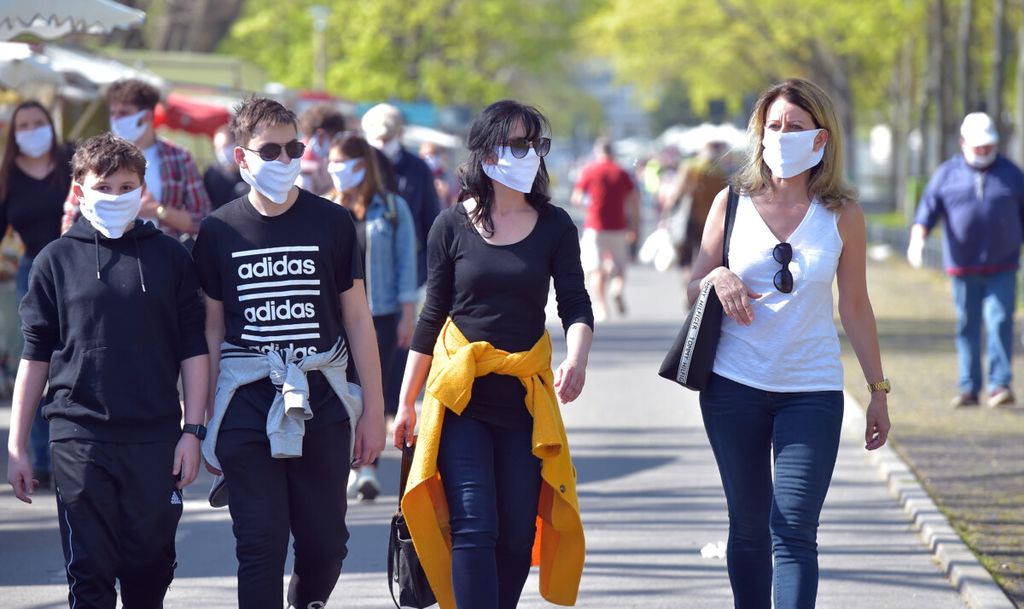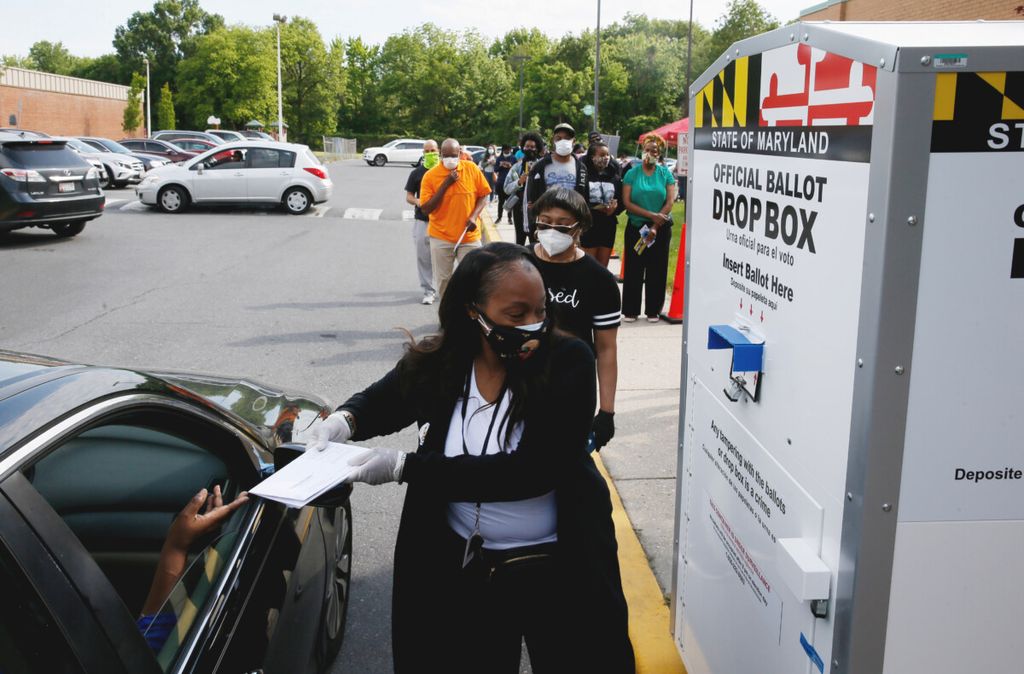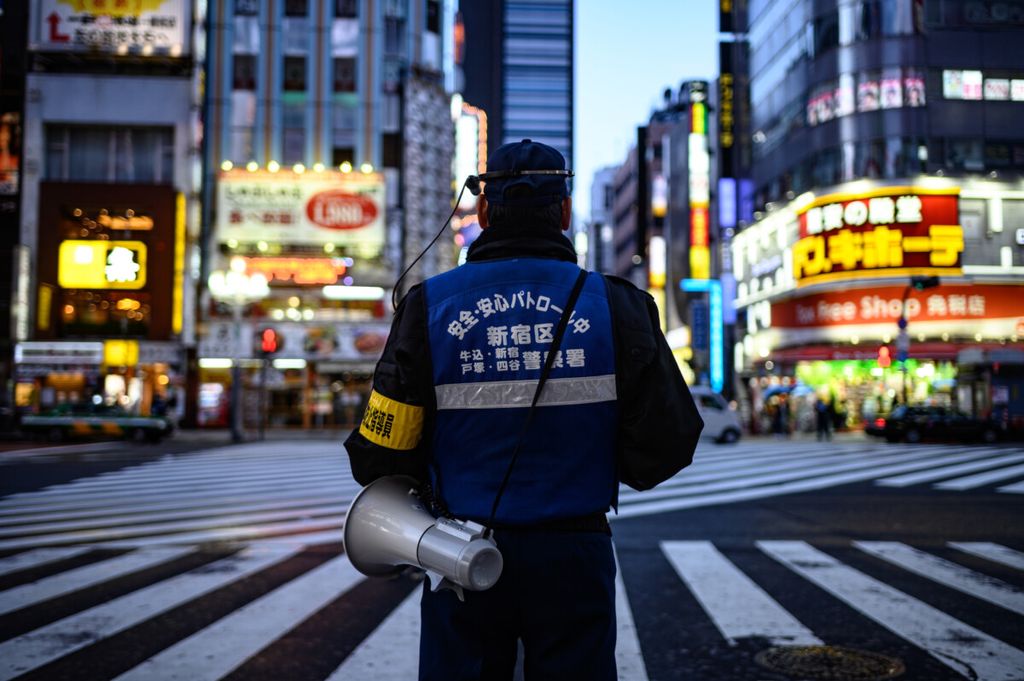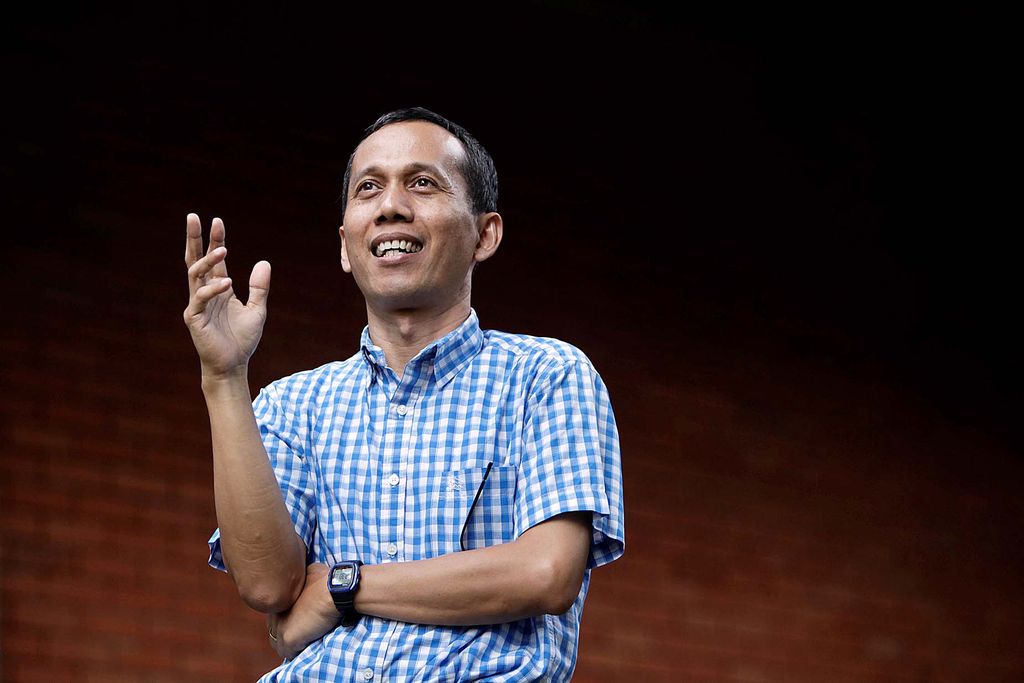Covid-19: Self-Discipline Test of a Nation
I used to live in Germany for almost six years for studying until my doctorate. Adding to that several research visits for almost a year, I practically resided in this football-loving country for seven years.

Visitors of a weekly market wear protective masks, as the spread of the coronavirus disease (COVID-19) continues in Dresden, Germany, April 17, 2020.
I used to live in Germany for almost six years for studying until my doctorate. Adding to that several research visits for almost a year, I practically resided in this football-loving country for seven years. While staying in Germany I got the impression that German society is very disciplined.
Only in Germany did I see pedestrians standing at a red light waiting for a green light in the middle of the night, when the highway was deserted. Visiting colleague researchers at my institute -- who were from other countries -- liked to complain because their apartment owners were too perfectionist.
Germany
Landlords would take issue with the lack of discipline in sorting waste on the part of the researching guests, who were so busy in the laboratory that they forgot to clean the apartment balcony, or who forgot to return the vacuum cleaner to its proper place. Anyway, all are required to be disciplined. Alles muss in Ordnung sein, this is the principle of Germany.
Read also: Discipline is the Keyword
As a lecturer, I often tell students about my experience studying in Germany more than a quarter of a century ago. There, the institute seminar was scheduled for five in the afternoon when the lecture was finished so that all could attend. Although not required, almost every seminar was full house. The teaching staff went home on average between six and seven in the afternoon.
At my current campus, even though it is classified as a top campus, ironically the department seminar must be set at one o\'clock in the afternoon and students must attend. The presence of lecturers is minimal.
One can imagine how many would show up if the seminar were scheduled for five in the afternoon and if students were not required to attend. Perhaps only the speakers and moderators would be present.
United States
After studying in Germany, I set foot in the country of "Uncle Sam", continuing my research adventure. My campus was The George Washington University, while my dormitory at Mitchell Hall is only two blocks from the White House.
The people were also more friendly. Life on campus? Standard, relatively relaxed.
In this country, I could breathe a little more relieved, because life was a bit more relaxed. The people were also more friendly. Life on campus? Standard, relatively relaxed. However, I always remember the words of my late supervisor at GWU before he came home from work: "Terry, don\'t work too hard. It is five p.m. You have to enjoy your life."

Maryland election judge Cassandra Campbell takes ballots from voters in their car to place them in a in a curbside ballot drop box to try to prevent the spread of coronavirus disease (COVID-19) during the Maryland U.S. presidential primary election as other voters stand in a long line waiting to cast their votes in College Park, Maryland, U.S., June 2, 2020.
The professors were very encouraging for beginner scientists like me. I felt at home there; the campus was small, all the inhabitants of the department were friendly and knew each other. But, most importantly, I needed a somewhat relaxed atmosphere to develop theoretical physics imagination.
Japan
Research collaboration is developing. In 1999 I flew to Okayama, Japan. I am acquainted with the hospitality of an Eastern culture that is different from the West. This is the Eastern hospitality that should be studied. However, behind the friendliness there is a work ethic and extraordinary discipline. This is a country whose inhabitants are very perfectionist, I realized.
One time, a Japanese colleague and I found a bug in the Fortran program that I had made. It was seven o\'clock in the evening, I was getting hungry. However, I noticed that my colleague and his students were waiting behind my chair, not saying a word, as if to signal: "We are waiting for the program to finish right now."

A police officer stands with a loud speaker by a crossing in the Shinjuku area of Tokyo on April 18, 2020. - Tokyo has seen emptier streets and significant drops in the number of people commuting each day on the city\'s notoriously crowded transport system as a nationwide state of emergency in Japan was declared on April 16 to stem the growing spread of the COVID-19 coronavirus.
Fortunately, at nine in the evening, the source of the bug was found, and at 10 we had dinner together at the restaurant. Before leaving campus, I was still able to peek at the Sensei post-graduate students that no one had gone home, still busy flipping through their books. This is the work ethic taught on the Japanese campus. At that second I was also grateful not to take the S-3 in Japan!
I salute the Japanese graduates who have returned to their homeland while still maintaining Japanese morale and discipline for a long time even though I know that in the end no one can stand the academic decay process, which is exactly like the oxidation reaction on iron!
When another colleague, a professor from Bochum, Germany, took part in Okayama, he shook his head. He said: "We used to feel that we were the most disciplined workers on the planet. However, if we look at how the Japanese work, it seems we must revoke the claim."
He was very happy to visit Japan, especially when he saw that everything was done perfectly down to the details.
Comparison among countries
Upon returning to Indonesia, I feel this is the most relaxed, pleasant place to live, except if you want to pursue the achievements of colleagues in the three developed countries. Lately, I am reminded of that, after seeing the trends of Covid-19 cases in the four countries.
It is indeed irrelevant to compare Indonesia with the three developed countries, just as irrelevant to compare Indonesia with nondemocratic countries in the fight against Covid-19.
It seems clear that the discipline of a nation has a very strong correlation with the nation\'s achievements in fighting this virus. It is indeed irrelevant to compare Indonesia with the three developed countries, just as irrelevant to compare Indonesia with nondemocratic countries in the fight against Covid-19. However, the comparison of Covid-19 case trends in these three developed countries is worth learning for us.
Rarely do we hear praise for Japan that has made it through the peak of this outbreak with a small number of victims. Unlike Germany, whose chancellor is often praised for the fast and accurate steps to localize the spread of Covid-19, Japan is rarely heard.
In fact, unlike Germany, Japan was the first country affected by this virus after China. In addition to the closeness of the locations, statistics shows Japan was visited by 9.6 million Chinese tourists in 2019, 10 times more than in 2007 or five times more than those to Indonesia.
/https%3A%2F%2Fkompas.id%2Fwp-content%2Fuploads%2F2020%2F06%2F20200615_114134_1592208315.jpg)
The kiosk joins in Pasar Senen, Central Jakarta, still open even though the manager has begun to apply operational restrictions according to odd-even dates, per Monday (15/6/2020).
Although there is suspicion about the low swab testing in Japan, the culture of wearing masks, washing hands and bowing instead of shaking hands is believed by many experts to be the key. The Japanese habit of wearing masks when they have colds and the availability of hand sanitizer in front of elevators or in hotel receptions are other factors.
Deutsche Welle reported, with regard to the use of masks in Japan before the outbreak of Covid-19 there were 5.5 billion per year, or 43 masks per head. The use of masks skyrocketed after the pandemic. With the high discipline in compliance with all the three things, Japan quickly overcame this outbreak, with a number of positive cases of nearly one tenth of Germany, without territorial quarantine. A very contrasting situation is seen in America.
Indonesia
How about Indonesia? My feeling at present may be the same as the majority of residents who have confined themselves for three months at home, doing activities from home, and trying not to give in to the temptation of ending unilateral social restrictions.
My feelings of annoyance may be the same as that of others when they see those who casually begin to travel without masks and without distance restrictions and even regard Covid-19 a conspiracy. These are the real causes behind the longer implementation of the social restrictions.
Read also: Preventing New Clusters at Shopping Centers
It could be that the difference in the number of swab tests in the four countries is the cause of the difference in the absolute number of positive cases of Covid-19. However, cultural differences and the discipline of citizens preventing the spread of the virus are the answer to the difference in the patterns of addition of positive cases.
It is obvious, we have the lowest discipline. So let us use this Covid-19 moment to improve the discipline of the nation.

Terry MartTerry Mart, Physicist at the University of Indonesia and Member of AIPI